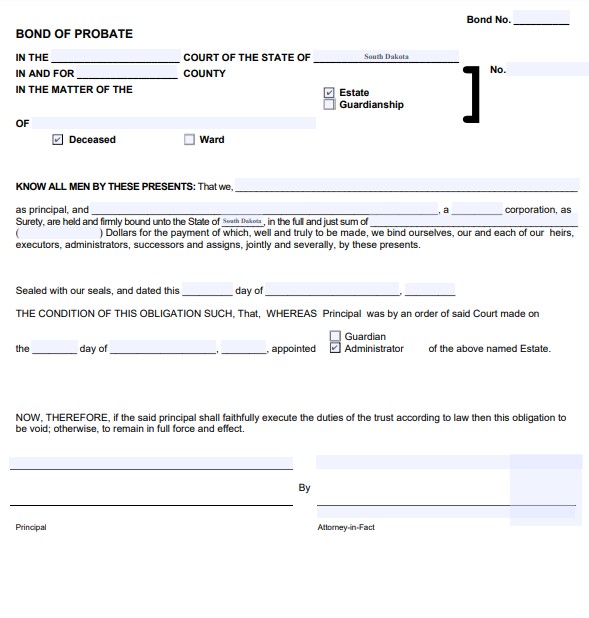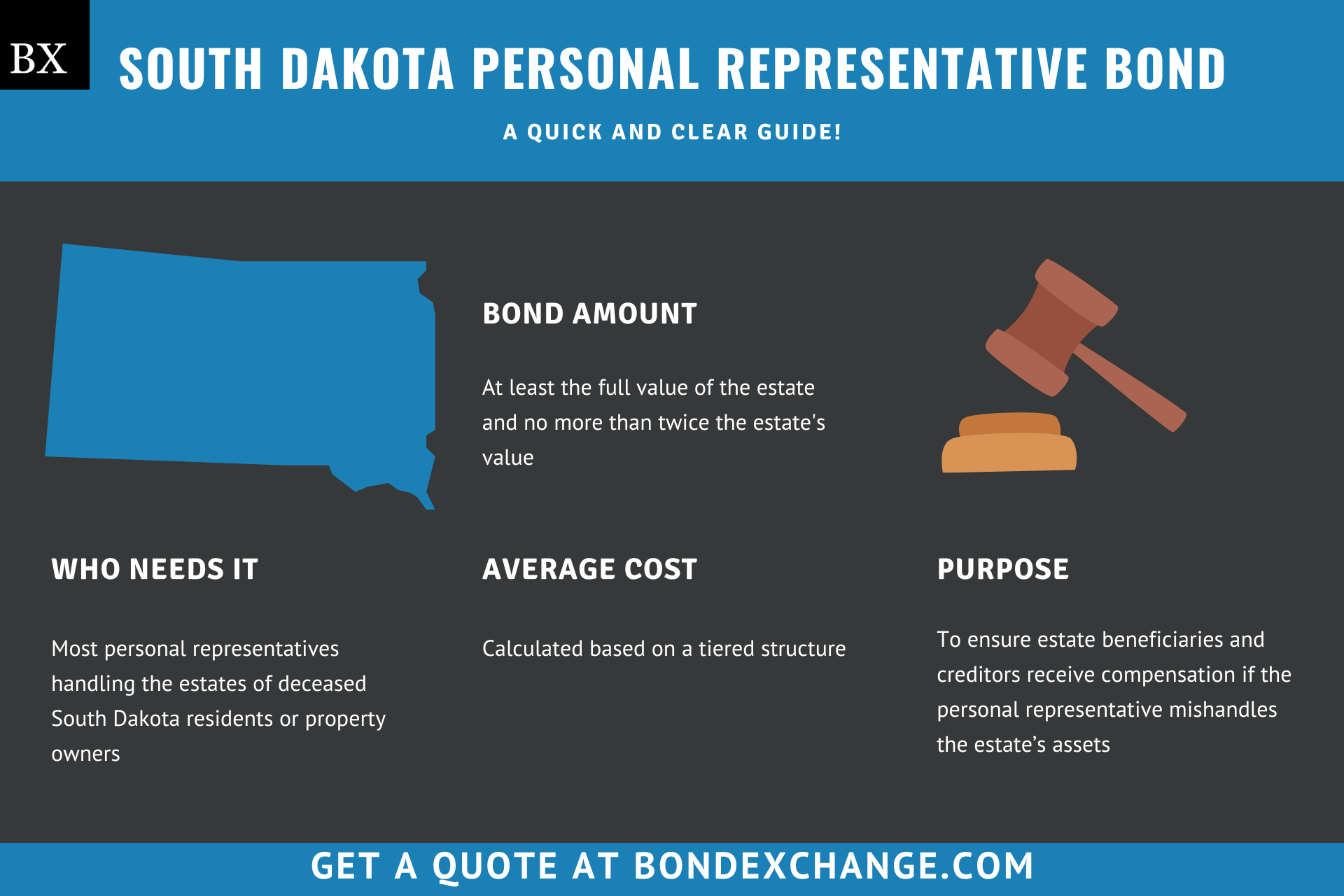South Dakota Personal Representative Bond: A Comprehensive Guide
This guide provides information for insurance agents to help their customers obtain a South Dakota Personal Representative bond.
At a Glance:
- Lowest Cost: Calculated based on a tiered structure
- Bond Amount: Determined on a case-by-case basis (more on this later)
- Who Needs it: Most personal representatives handling the estates of deceased South Dakota residents or property owners
- Purpose: To ensure estate beneficiaries and creditors receive compensation if the personal representative mishandles the estate’s assets
- Who Regulates Personal Representatives in South Dakota: The circuit court with jurisdiction over where the deceased individual resided or had property
Background
South Dakota Statute 29A-3-103 requires all personal representatives of an estate to be appointed by a court before assuming their fiduciary duties. The South Dakota legislature enacted the appointment requirement to ensure that personal representatives do not mismanage the estate’s assets. To provide financial security for the enforcement of this requirement, most personal representatives must purchase a probate surety bond to be eligible for appointment.
What is the Purpose of the South Dakota Personal Representative Bond?
South Dakota requires personal representatives to purchase a surety bond as a prerequisite to being appointed as a fiduciary over an estate’s assets. The bond ensures that the estate’s beneficiaries and creditors will receive compensation for financial harm if the personal representative fails to abide by the regulations outlined in South Dakota Statute 29A-3-606. Specifically, the bond protects beneficiaries and creditors if the personal representative mismanages the estate’s assets. In short, the bond is a type of insurance that protects the estate’s beneficiaries and creditors if the personal representative violates their fiduciary duties.

How Can an Insurance Agent Obtain a South Dakota Personal Representative Surety Bond?
BondExchange makes obtaining a South Dakota Personal Representative bond easy. Simply login to your account and use our keyword search to find the “Probate” bond in our database. Don’t have a login? Gain access now and let us help you satisfy your customers’ needs. Our friendly underwriting staff is available by phone (800) 438-1162, email or chat from 7:30 AM to 7:00 PM EST to assist you.
At BondExchange, our 40 years of experience, leading technology, and access to markets ensures that we have the knowledge and resources to provide your clients with fast and friendly service whether obtaining quotes or issuing bonds.
Not an agent? Then let us pair you with one!
Click the above image to find a BX Agent near you
How is the Bond Amount Determined?
South Dakota Statute 29A-3-604 states that the bond amount must be equal to the personal representative’s best estimation of the estate’s value, including all estimated income the estate will generate over the next year. However, the will may have specified the bond amount, in which case the personal representative must purchase a bond in that amount instead. Additionally, the bond amount may be reduced if the personal representative deposits any of the estate’s assets with a financial institution located in South Dakota that prevents their unauthorized disposition.
What are the Underwriting Requirements for the South Dakota Personal Representative Bond?
Most surety companies will examine the following factors when determining eligibility for the South Dakota Personal Representative bond:
- Personal representative’s credit history (not considered for bonds with limits less than $25,000)
- Whether or not the estate has an attorney (not considered for bonds with limits less than $25,000)
- How long the fiduciary appointment is for
- Whether or not the personal representative is replacing a prior fiduciary
- If the personal representative has ever committed a felony
- If there are disputes among the estate’s beneficiaries
- Whether or not there is any ongoing business in the estate
- If the bond is being required by a creditor
How Much Does the South Dakota Personal Representative Bond Cost?
Surety companies typically determine the premium rate for personal representative bonds based on a tiered structure. As a result, larger bond amounts will be charged a lower premium rate than smaller bonds.
The following table illustrates the pricing structure for the South Dakota Personal Representative bond:
$1,500,000 Personal Representative Bond Cost
| Bond Amount | Premium Rate | Total Bond Cost |
|---|---|---|
| First $20,000 | 0.75% | $150 |
| Next $40,000 | 0.60% | $240 |
| Next $140,000 | 0.50% | $700 |
| Next $300,000 | 0.375% | $1,125 |
| Next $1,000,000 | 0.25% | $2,500 |
| Total cost of $4,715 |
Who is Required to Purchase the South Dakota Personal Representative Bond?
South Dakota requires personal representatives to purchase a surety bond as a prerequisite to obtaining a fiduciary appointment. To paraphrase South Dakota Statute 29A-1-201, a personal representative is a court-appointed fiduciary responsible for administering a deceased individual’s estate. Personal representatives are referred to as executors if the deceased individual nominated them in their will, or administrators if they were not nominated in the will or if no will exists.
Personal representatives are not required to purchase a bond if:
- The will expressly waives the bond requirement
- They are a bank or qualified trust company
- The court waives the bond requirement

BondExchange now offers monthly pay-as-you-go subscriptions for surety bonds. Your customers are able to purchase their bonds on a monthly basis and cancel them anytime. Learn more here.
How do Personal Representatives Become Appointed in South Dakota?
Personal representatives in South Dakota must navigate several steps to become court-appointed fiduciaries. Below are the general guidelines, but applicants should refer to South Dakota’s uniform probate code for details on the process.
Step 1 – Determine Priority
Priority for appointment as a personal representative will be granted in the following order:
-
- Persons nominated in the will
- The surviving spouse if the deceased individual left them real estate
- Any person the deceased individual left real estate
- The surviving spouse if they were not left real estate
- Any other heir of the deceased individual
- Any other qualified person if no one has applied for appointment 45 days after the individual died
Persons with priority may nominate another person to serve in their place. Nominated individuals will have the same priority as the person who nominated them.
Step 2 – Hire an Attorney
Although not explicitly required, it is highly recommended that personal representatives hire an attorney to assist with the probate process.
Step 3 – Determine the Estate Administration Process
South Dakota has three estate administration processes, as outlined below:
-
- Small Estate: Available for estates consisting solely of personal property worth $25,000 or less. A probate proceeding is not required for small estates, as they can be transferred with an affidavit. There is no bond requirement for small estates, as a personal representative is not needed.
- Informal Probate: Allows the personal representative to administer the estate with minimal court supervision. All estates, regardless of their size, are eligible for informal probate.
- Formal Testacy: Required when a person with an interest in the estate petitions the court to hold a hearing and rule on the validity of the will and determine how the estate will be administered.
Step 4 – Contact the Court
Persons with priority must contact the circuit court with jurisdiction over the estate to obtain their appointment. A representative of the court will walk the personal representative through the appointment process, provide them with all required forms, and answer any questions they may have.
Unless the estate qualifies for the small estate administration process, personal representatives will most often apply for informal probate. All informal probate applications must contain the information required by South Dakota Statute 29A-3-301.
Any person with an interest in the estate may object to the personal representative’s appointment and may petition the court for their removal and formal testacy.
Step 5 – Purchase a Surety Bond
Unless otherwise exempt, personal representatives must purchase and maintain a surety bond (limits outlined above).
How do South Dakota Personal Representatives File Their Bonds?
Personal representatives should submit their completed bond forms, including the power of attorney, to the circuit court with jurisdiction over the estate.
The surety bond requires signatures from both the surety company that issues the bond and the personal representative. The surety company should include the following information on the bond form:
- Court where the bond is to be filed
- Legal name of the entity/individual(s) buying the bond
- Surety company’s name and state of incorporation
- Bond amount
- Date the bond is signed
- Date the fiduciary appointment was made
What can South Dakota Personal Representatives do to Avoid Claims Made Against Their Bonds?
To avoid claims against their bonds, personal representatives in South Dakota must ensure that they:
- Fulfill their fiduciary duties
- Do not mismanage the estate’s assets
- Pay all required court costs, attorney’s fees, and other relevant expenses

